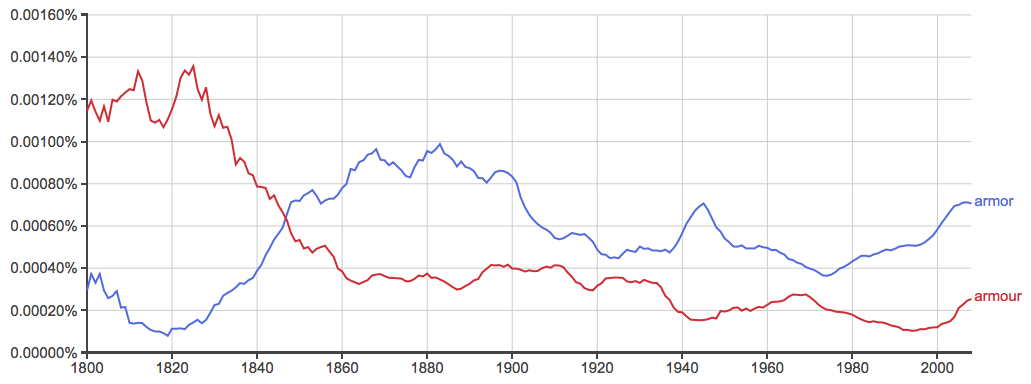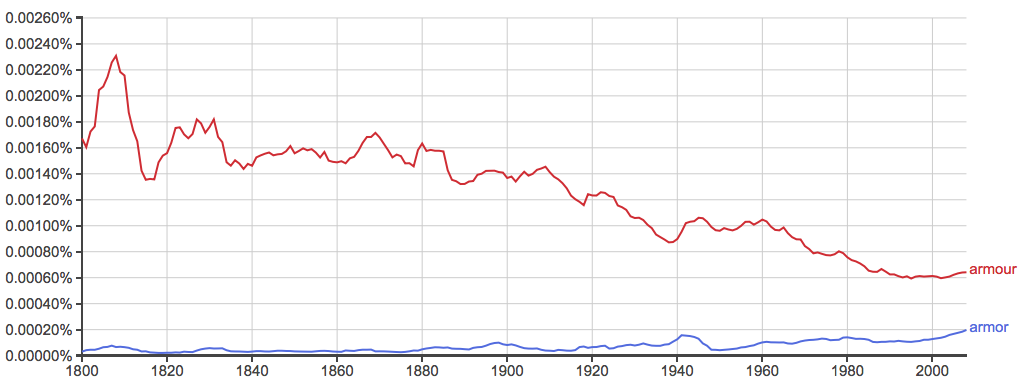Most people who consume Western media have read books or watched movies about a time, centuries past, when knights went to battle, clad in shiny metal uniforms meant to protect them from the murderous blades and arrows of their enemies.
But what are those shiny metal clothes called? Is it a suit of armor, or a suit of armour?
The answer is not as simple as you might expect, and it involves spelling differences between American and British English. If you aren’t sure whether you should use armour or armor in your own writing, continue reading for an explanation of these two terms.
Armor vs Armour: What’s the Difference?
In this article, I will compare armor vs armour. I will use each of these spellings in a sentence to illustrate the proper context for each. Then, I will tell you a useful mnemonic to help you decide whether to use armor or armour in your own writing.
When to Use Armor
 What does armor mean? Armor can function as both a noun and a verb.
What does armor mean? Armor can function as both a noun and a verb.
As a noun, armor means a protective covering.
As a verb, armor means to don protective covering or to protect oneself. You can see examples in the sentences below:
- You must armor yourself in the fight against evil.
- “Bring me my armor!” the knight commanded his squire.
- An insect’s exoskeleton forms an armor around its soft insides.
- David H. Brooks, the founder of America’s leading supplier of body armor to the U.S. military, died in prison while serving a 17-year sentence for running a stock-fraud scheme. –The Wall Street Journal
Armor is the preferred spelling of this word in American English.
When to Use Armour
 What does armour mean? Armour is the British English spelling of the same word. It can be used in all the same contexts as armor. While, armor is the preferred spelling among American audiences, armour is the preferred spelling among British audiences.
What does armour mean? Armour is the British English spelling of the same word. It can be used in all the same contexts as armor. While, armor is the preferred spelling among American audiences, armour is the preferred spelling among British audiences.
- Galea is accused of researching homemade bombs, ballistic armour and guns. –The Guardian
The charts below display the rate of usage of armor vs. armour in English books in the American and British English language communities, respectively.


As you can see, at least since 1800, American writers have used armor, whereas British writers have gravitated towards armour.
These charts are not scientifically precise; they only graph the usage of these words in books written in English since the dawn of the 19th century. Still, they are useful for illustrating a long-term trend.
Trick to Remember the Difference
Here is a helpful trick to remember armour vs. amor.
You should use armor for predominantly American audiences, and armour for predominantly British audiences, regardless of context. These preferences hold true whether the word is being used as a noun or a verb.
To help yourself remember when to use these words, remember that armour, the British variant, and U.K. are each spelled with a U. This shared letter can link armour to the British audiences who prefer this spelling.
Summary
Is it armor or armour? Armor and armour are two spelling variants of the same verb, which can function as a noun or a verb. As a noun, it refers to a protective covering, and as a verb it means to wear such a covering or to otherwise protect oneself.
- American writers spell this word armor.
- British writers are more likely to spell it
Since armour and U.K. each have a U in them, this idiosyncrasy should be simple to remember.
In conclusion, armor and armour are two ways to spell the same verb. Armor is the American version, and armour is the British version.
Contents
